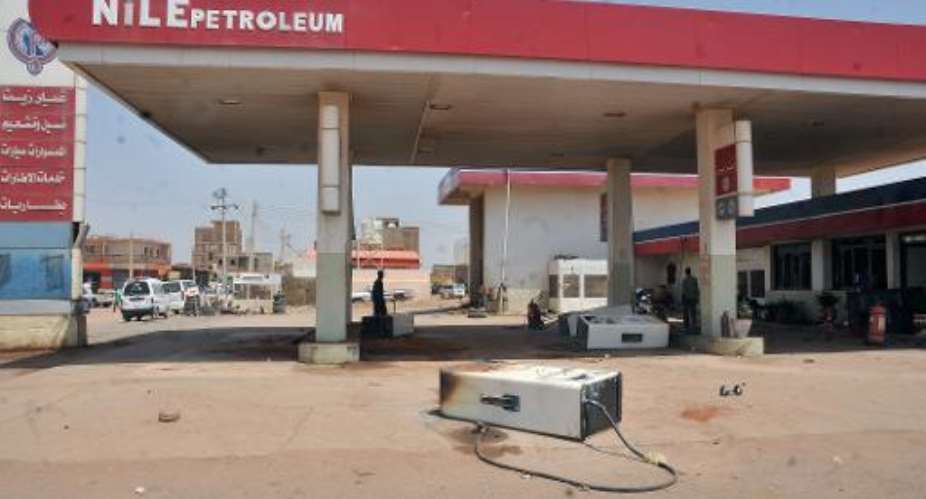Khartoum (AFP) - Sudan's new cabinet on Monday approved a budget ruling out price increases, after the slashing of fuel subsidies in September led to the worst urban unrest of President Omar al-Bashir's 24-year rule.
"This budget will not include increases in taxation, nor will it raise other prices," Finance Minister Badereldien Mahmoud told reporters after ministers endorsed the 2014 financial estimates.
The budget will go before parliament on Wednesday.
In September, the government slashed fuel subsidies and unified its multiple foreign exchange rates, measures recommended by the International Monetary Fund.
The resulting jump of more than 60 percent in the retail price of fuel drove thousands into the streets in protest.
Security forces are believed to have killed more than 200 demonstrators, Amnesty International said, but authorities reported a toll of less than half that.
Analysts said the spontaneous protests pointed to an urgent need for change by the Arab-dominated regime, which is grappling with ethnic rebellions in Darfur, South Kordofan and Blue Nile states, dissension within its own ranks, economic crisis and international isolation.
Bashir, who took power in a 1989 Islamist-backed coup, last Sunday replaced his two vice presidents and unveiled a partially new cabinet.
Mahmoud took over from Ali Mahmud al-Rasul, who presided over the collapse of the Sudanese currency and soaring inflation after the separation of South Sudan in 2011.
But the new minister himself was among "the people who made policy before," said Magdi El Gizouli, a fellow at the Rift Valley Institute.
Mahmoud was deputy governor at the Central Bank of Sudan before his ministerial appointment.
An editorial in the Sudan Vision daily last Thursday said Mahmoud should call for a delay in tabling the 2014 budget in parliament because it was prepared before his appointment.
"The new minister will have no time to review or reconsider the contents of the budget" the newspaper said.
On Monday Mahmoud declined to reveal projected revenue and expenditure figures to reporters.
"This is a budget aiming to restore economic stability,", he said, adding that the government seeks to halve inflation over the next year and boost GDP growth by 2.6 percent.
Inflation hit 42.6 percent in November, according to official figures.
The IMF has projected a 2.5 percent rise in Sudan's real gross domestic product next year, down from a forecast 3.9 percent this year.
Khartoum lost billions of dollars in export earnings when South Sudan became independent, taking with it most of Sudan's oil production.
Since then the government has struggled with a shortage of hard currency and revenue.
Mahmoud said the budget will incorporate as revenue fees Khartoum will receive for exporting South Sudanese oil.
The IMF has estimated that Sudan's economy would get a boost of about $1.5 billion in 2014 from those fees and a package to compensate for the loss of the South's oil at separation.
After South Sudan's independence the oil refineries and export pipelines stayed under Khartoum's jurisdiction.
But disputes over the fees and border security created uncertainty over the oil flow until Bashir and his southern counterpart Salva Kiir held talks in September.
If used wisely, the oil compensation package would "provide a very valuable breathing space" for an economy which must be restructured, including through the revitalisation of neglected sectors like agriculture, an IMF official has said.
Although next year's budget contains no new taxes, Mahmoud said a government effort to widen the tax base will continue.
The IMF earlier this year said government revenues had increased through more efficient administration of the tax system.





 Former Kotoko Player George Asare elected SRC President at PUG Law Faculty
Former Kotoko Player George Asare elected SRC President at PUG Law Faculty
 2024 elections: Consider ‘dumsor’ when casting your votes; NPP deserves less — P...
2024 elections: Consider ‘dumsor’ when casting your votes; NPP deserves less — P...
 You have no grounds to call Mahama incompetent; you’ve failed — Prof. Marfo blas...
You have no grounds to call Mahama incompetent; you’ve failed — Prof. Marfo blas...
 2024 elections: NPP creates better policies for people like us; we’ll vote for B...
2024 elections: NPP creates better policies for people like us; we’ll vote for B...
 Don’t exchange your life for wealth; a sparkle of fire can be your end — Gender ...
Don’t exchange your life for wealth; a sparkle of fire can be your end — Gender ...
 Ghana’s newly installed Poland train reportedly involved in accident while on a ...
Ghana’s newly installed Poland train reportedly involved in accident while on a ...
 Chieftaincy disputes: Government imposes 4pm to 7am curfew on Sampa township
Chieftaincy disputes: Government imposes 4pm to 7am curfew on Sampa township
 Franklin Cudjoe fumes at unaccountable wasteful executive living large at the ex...
Franklin Cudjoe fumes at unaccountable wasteful executive living large at the ex...
 I'll 'stoop too low' for votes; I'm never moved by your propaganda — Oquaye Jnr ...
I'll 'stoop too low' for votes; I'm never moved by your propaganda — Oquaye Jnr ...
 Kumasi Thermal Plant commissioning: I pray God opens the eyes of leaders who don...
Kumasi Thermal Plant commissioning: I pray God opens the eyes of leaders who don...
